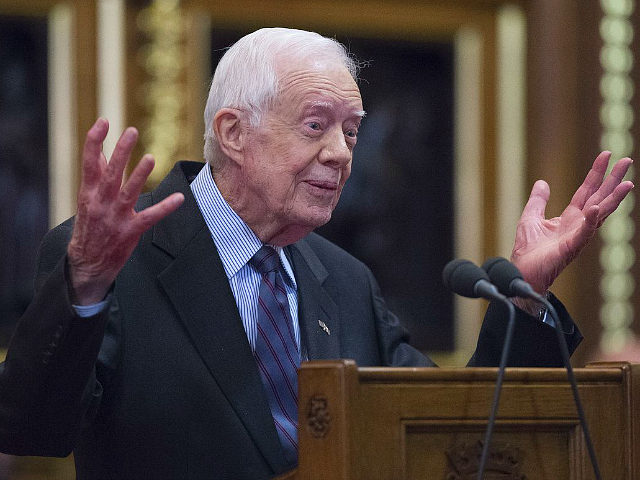Arizona Attorney General Mark Brnovich recalled on Monday how former President Jimmy Carter, in 2005, warned of the fraud risks associated with ballot harvesting and mail-in voting.
Brnovich discussed his forthcoming Supreme Court opposite the Democratic National Committee (DNC) case in an interview on SiriusXM’s Breitbart News Daily with host Alex Marlow. He reflected on the Commission on Federal Election Reform report of 2005 — a bipartisan report authored by Carter former Secretary of State James Baker.
The DNC is characterizing Arizona’s limitations on ballot harvesting and out-of-precinct voting as racially discriminatory. SCOTUSblog outlined two consolidated Supreme Court issues related to Democrat challenges against Arizona’s voting laws, Brnovich v. Democratic National Committee and Arizona Republican Party v. Democratic National Committee:
The cases challenge two Arizona voting provisions: a policy that requires an entire ballot to be thrown out if the ballot was cast at the wrong precinct, and a state law that bans the collection of ballots by third parties, sometimes called “ballot harvesting.” The challengers argue that both the policy and the law discriminate against racial minorities in Arizona, and the justices’ eventual ruling obviously could affect how the state carries out its elections going forward. More broadly, though, the justices could also weigh in on the proper test for evaluating voting-rights claims like these, which could have a sweeping effect nationwide.
Brnovich remarked, “No less than Jimmy Carter in 2004 — I don’t agree with the guy on very much, probably on nothing, but like a broken clock he’s right twice a day — actually co-chaired [an election] commission and said that absentee ballots are one of the greatest sources of fraud.”
“[Jimmy Carter] recognized that when you have people handling a ballot other than the person voting, it can create opportunities [for fraud],” Brnovich said. “I have a front-page story literally sitting in front of me right now from the 2012 New York Times, where it literally said that ballots cast by mail are more likely to be compromising and contested, and statistics show election officials reject mail-in ballots [at a rate of] two percent, double the rate of in-person voting.”
LISTEN:
The Biden administration’s Department of Justice disagreed with the DNC’s framing of Arizona’s voting laws as manifestations of racial discrimination. Brnovich wrote in a statement:
The DNC claims Arizona’s restrictions on ballot harvesting and out-of-precinct voting violate Section 2 of the Voting Rights Act and the ballot harvesting restriction was also enacted with discriminatory intent; however, even the Biden Justice Department disputed that claim in a recent SCOTUS filing.
“What I think [the Supreme Court needs] to do is interpret the Voting Rights Act the way it was supposed to be designed,” Brnovich said. “The Voting Rights Act was designed to ensure equal opportunity for all. … Anytime that there was a statistical disparity, anytime there was a difference between white and non-white voters, that does not mean it’s automatically a violation of the Voting Rights Act. There could be a lot of reasons why people in one particular area don’t vote at higher rates than another group.
“Unless there’s a substantial impact on the ability of someone to vote, it’s legal,” he added. “We do not want judges basically micromanaging the elections, and we saw this in the last election when you had all this uncertainty and all this doubt because judges were coming into the laws. In Arizona, half a dozen times, I had to step up and come in and defend existing laws whether it was [if] you could submit electronic ballot signatures, whether ballots could be cured on Election Day that were mail-in ballots.”
Brnovich explained the rationale for out-of-precinct voting laws, in which voters must cast their ballots at assigned polling stations determined by their primary residence. He said such laws allow for effective logistics and resource allocation.
“Since the 1970s, we’ve had restrictions on out-of-precinct voting and actually a majority of states have restrictions o out-of-precinct voting, so this isn’t some new or radical concept. Basically, what that means is, you have an assigned precinct, and that is where you need to go to vote. The reason why we do that is because you want order in elections. You want people to go to the right precinct, so they’re casting a ballot that will be counted. You want them to the right precinct, so the precinct can prepare enough ballots so they can have enough people working at the polling station so we don’t end up with long lines and polling places being overwhelmed and the ballots not being secured,” he said.
“It’s really a basic kind of common sense measure,” he said. “A lot of states have [out-of-precinct voting rules] and it’s a way to create order in elections. … Sometimes it’s a head scratcher as to why someone would think that violates the Voting Rights Act or has any sort of disparate impact on any ethnic or minority group.”
Asked of his impressions thus far of Supreme Court justices’ attitudes towards his case, Brnovich described Justices Elena Kagan and Sonia Sotomayor as “very hostile” to Arizona’s restrictions on ballot harvesting and out-of-precinct voting. He assessed Justices Samuel Alito and Brett Kavanaugh, conversely, as “sympathetic” to Arizona’s voting laws.
“This really is about federalism,” Brnovich held, “because we do not want the federal government micromanaging state elections.”
Brnovich warned, “When you control the ballot, you can control the election.”
Democrats are pushing for national legalization of ballot harvesting, elimination of voter-ID laws, and automatic mailing out of ballots to names and addresses on existing voter rolls via H.R. 1, named the For the People Act.
Breitbart News Daily broadcasts live on SiriusXM Patriot 125 weekdays from 6:00 a.m. to 9:00 a.m. Eastern.

COMMENTS
Please let us know if you're having issues with commenting.